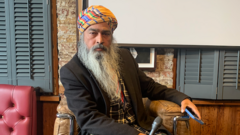The search for the true identity of Bitcoin's creator, the elusive Satoshi Nakamoto, encountered yet another setback when a press conference intended to unveil the mysterious figure concluded without any credible evidence. The Bitcoin phenomenon, which now supports a monumental $2 trillion cryptocurrency industry, continues to fascinate many, largely due to the unidentified individual behind its conception.
On Thursday, excitement surged within the crypto community at the announcement of this significant press event. Satoshi Nakamoto is not just the creator of Bitcoin but is believed to hold over a million bitcoins, marking him as a potential multi-billionaire. However, the anticipation was met with disappointment. Organiser Charles Anderson demanded payment for attendance, with tickets priced at £100 and an additional £500 for an exclusive interview with "Satoshi."
When the time came, only a handful of reporters gathered at the Frontline Club in London, many skeptical of the claims being made. Initial hope faded as it was soon revealed that Anderson and Mollah were dealing with ongoing legal disputes related to fraud allegations over claims of identity.
When Mollah took to the stage, he boldly declared, "I am Satoshi Nakamoto and I created Bitcoin using Blockchain technology,” but failed to provide substantial evidence to back his assertion during the hour-long event. Reporters grew increasingly disillusioned as Mollah promised to interact with the first bitcoins ever created—an act attributed solely to Satoshi himself—yet did not follow through.
Skepticism around Mollah’s claims was well-founded, and he joins a long list of those who have previously claimed the identity of Satoshi. Past individuals include Dorian Nakamoto, who rejected claims made by Newsweek in 2014, and Craig Wright, who vacillated between claiming and denying his alleged role as Satoshi without ever providing definitive proof.
What remains evident is the significance of Satoshi's anonymity. While some believe that the "who" behind Bitcoin matters, others argue that maintaining this secrecy promotes a trust in Bitcoin as a decentralized system rather than a centralized figurehead. Participants in the cryptocurrency realm appear divided on whether pinpointing Satoshi Nakamoto will only distract from the broader implications of cryptocurrency on the economy.
As the event closed, one thing was clear: the search for Bitcoin’s father figure remains unsolved, continuing to intrigue and perplex both the general public and those deeply invested in the crypto world.




















